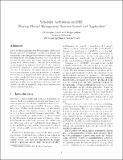Scheduler Activations on BSD: Sharing Thread Management Between Kernel and Application

View/
Metadata
Show full item recordCitation
Small, Christopher and Margo Seltzer. 1995. Scheduler Activations on BSD: Sharing Thread Management Between Kernel and Application. Harvard Computer Science Group Technical Report TR-31-95.Abstract
There are two commonly used thread models: kernel level threads and user level threads. Kernel level threads suffer from the cost of frequent user-kernel domain crossings and fixed kernel scheduling priorities. User level threads are not integrated with the kernel, blocking all threads whenever one thread is blocked. The Scheduler Activations model, proposed by Anderson et al. [ANDE91], combines kernel CPU al location decisions with application control over thread scheduling. This paper discusses the performance characteristics of an implementation of Scheduler Activations for a uniprocessor BSD system, and proposes an analytic model for determining the class of applications that benefit from its use. Our implementation required fewer than two hundred lines of kernel code and provides an order of magnitude performance improvement over process-level facilities.Terms of Use
This article is made available under the terms and conditions applicable to Other Posted Material, as set forth at http://nrs.harvard.edu/urn-3:HUL.InstRepos:dash.current.terms-of-use#LAACitable link to this page
http://nrs.harvard.edu/urn-3:HUL.InstRepos:26506451
Collections
- FAS Scholarly Articles [18292]
Contact administrator regarding this item (to report mistakes or request changes)


